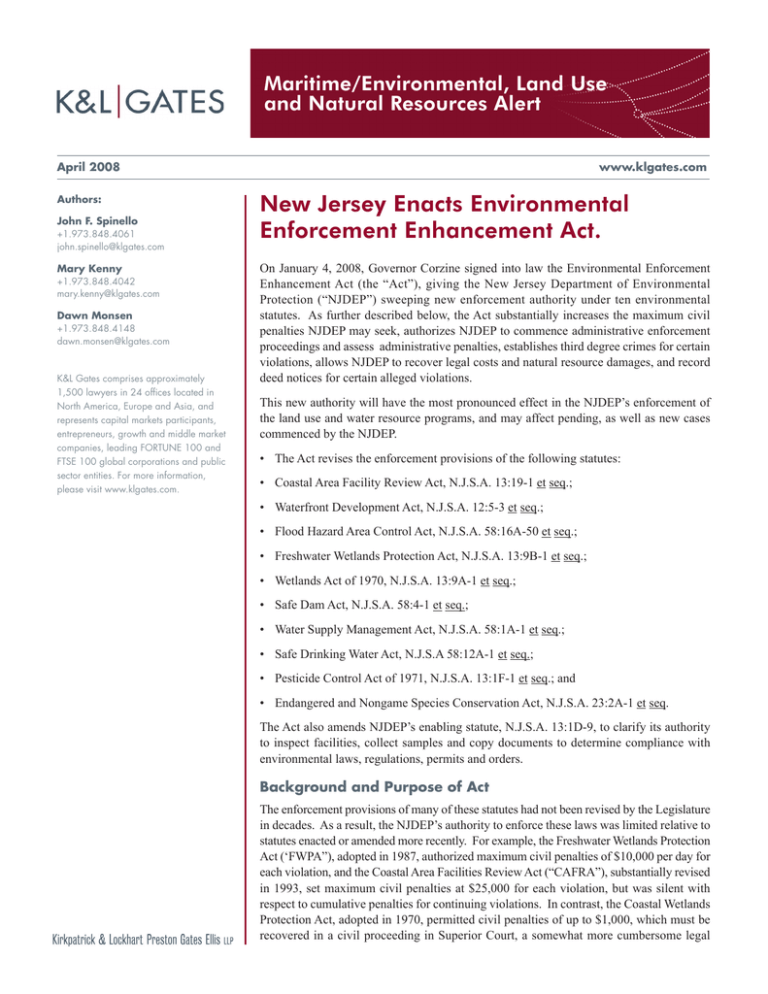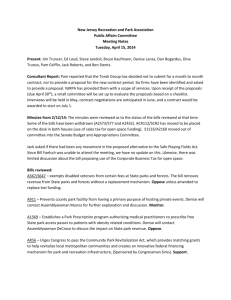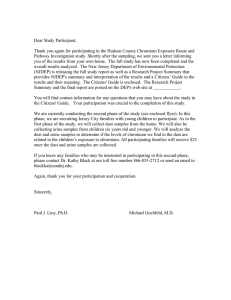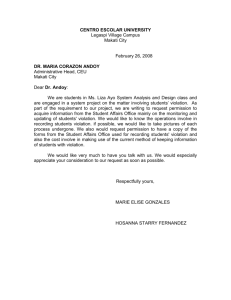
Maritime/Environmental, Land Use and Natural Resources Alert
April 2008
Authors:
John F. Spinello
+1.973.848.4061 john.spinello@klgates.com
Mary Kenny
+1.973.848.4042
mary.kenny@klgates.com
Dawn Monsen
+1.973.848.4148
dawn.monsen@klgates.com
K&L Gates comprises approximately
1,500 lawyers in 24 offices located in
North America, Europe and Asia, and
represents capital markets participants,
entrepreneurs, growth and middle market
companies, leading FORTUNE 100 and
FTSE 100 global corporations and public
sector entities. For more information,
please visit www.klgates.com.
www.klgates.com
New Jersey Enacts Environmental
Enforcement Enhancement Act.
On January 4, 2008, Governor Corzine signed into law the Environmental Enforcement
Enhancement Act (the “Act”), giving the New Jersey Department of Environmental
Protection (“NJDEP”) sweeping new enforcement authority under ten environmental
statutes. As further described below, the Act substantially increases the maximum civil
penalties NJDEP may seek, authorizes NJDEP to commence administrative enforcement
proceedings and assess administrative penalties, establishes third degree crimes for certain
violations, allows NJDEP to recover legal costs and natural resource damages, and record
deed notices for certain alleged violations.
This new authority will have the most pronounced effect in the NJDEP’s enforcement of
the land use and water resource programs, and may affect pending, as well as new cases
commenced by the NJDEP.
• The Act revises the enforcement provisions of the following statutes:
• Coastal Area Facility Review Act, N.J.S.A. 13:19-1 et seq.;
• Waterfront Development Act, N.J.S.A. 12:5-3 et seq.;
• Flood Hazard Area Control Act, N.J.S.A. 58:16A-50 et seq.;
• Freshwater Wetlands Protection Act, N.J.S.A. 13:9B-1 et seq.;
• Wetlands Act of 1970, N.J.S.A. 13:9A-1 et seq.;
• Safe Dam Act, N.J.S.A. 58:4-1 et seq.;
• Water Supply Management Act, N.J.S.A. 58:1A-1 et seq.;
• Safe Drinking Water Act, N.J.S.A 58:12A-1 et seq.;
• Pesticide Control Act of 1971, N.J.S.A. 13:1F-1 et seq.; and
• Endangered and Nongame Species Conservation Act, N.J.S.A. 23:2A-1 et seq.
The Act also amends NJDEP’s enabling statute, N.J.S.A. 13:1D-9, to clarify its authority
to inspect facilities, collect samples and copy documents to determine compliance with
environmental laws, regulations, permits and orders.
Background and Purpose of Act
The enforcement provisions of many of these statutes had not been revised by the Legislature
in decades. As a result, the NJDEP’s authority to enforce these laws was limited relative to
statutes enacted or amended more recently. For example, the Freshwater Wetlands Protection
Act (‘FWPA”), adopted in 1987, authorized maximum civil penalties of $10,000 per day for
each violation, and the Coastal Area Facilities Review Act (“CAFRA”), substantially revised
in 1993, set maximum civil penalties at $25,000 for each violation, but was silent with
respect to cumulative penalties for continuing violations. In contrast, the Coastal Wetlands
Protection Act, adopted in 1970, permitted civil penalties of up to $1,000, which must be
recovered in a civil proceeding in Superior Court, a somewhat more cumbersome legal
Maritime/Environmental, Land Use
and Natural Resources Alert
process compared with the administrative proceedings
authorized by CAFRA and the FWPA. Similarly, the
Waterfront Development Act permits civil penalties of
up to $1,000 per violation and $100 for each additional
day the violation continues.
The NJDEP concluded these and other limitations on
its enforcement authority were hampering its ability
to ensure compliance with these statutes; NJDEP
believed some scofflaws were ignoring Orders it issued
to remedy violations because the limited sanctions
available failed to provide an adequate deterrent to
noncompliance or foster the timely resolution of
violations. In May 2007, bills were introduced in
the Senate and Assembly at the NJDEP’s request to
substantially revise the ten statutes referenced above
by providing NJDEP with sweeping new authority
to impose a stronger and wider range of sanctions
for noncompliance. The version of the bill initially
introduced would have authorized civil penalties of
up to $50,000 per day, criminalized negligent conduct,
such as the unintentional filing of incorrect information
with the NJDEP, and allowed other excessive sanctions
that could not be justified. Many of these excessive
provisions were eventually removed or revised by the
Legislature at the urging of a coalition led by the NJ
Business and Industry Association (“NJBIA”).
Key Provisions of the Act
Maximum Civil Penalties Increased. The Act increases
the maximum civil penalty under all ten statutes
to $25,000 per day for each violation. As noted
above, for some statutes this is a 2500% increase. See Table 1 for further details. Table 1
Statute
Previous Maximum Penalty
As Amended by the Act
Waterfront Development Act:
$1,000, $100 for each day it continues
$25,000 per violation, per day
Pesticide Act:
$3,000 per violation
$25,000 per violation, per day
Coastal Wetlands Act:
Freshwater Wetlands:
$1,000 per violation
$25,000 per violation, per day
$10,000 per violation
$25,000 per violation, per day
CAFRA:
$25,000 per violation
$25,000 per violation, per day
$25,000 per violation, per day
$25,000 per violation, per day
$25,000 per violation, per day
$25,000 per violation, per day
Endangered Species Act:
$5,000 per violation, per day
Water Supply Management Act: $5,000 per violation, per day
Dam Safety Act: $25,000 per violation, per day
Flood Hazard Act:
$2,500 per violation, per day
Safe Drinking Water Act: $5000 per day for first offense
$25,000 per violation, per day
$10,000 per day for second offense
$25,000 per day for third/subsequent offense
April 2008 | 2
Maritime/Environmental, Land Use
and Natural Resources Alert
Administrative Penalty Assessments Authorized.
The Act also authorizes the NJDEP to assess civil
administrative penalties. Previously, administrative
penalty authority was not available under the following
statutes:
NJDEP to recover the economic benefit realized by a
defendant as a result of an alleged violation, separate
and distinct from – and therefore over and above – the
statutory maximum penalty amount of $25,000 per
violation, per day.
• Flood Hazard Area Control Act, N.J.S.A. 58:16A-50
et seq.;
The NJBIA led coalition had sought the inclusion of
additional statutory criteria to expressly recognize
mitigating factors, such as an alleged violator’s degree
of cooperation in an investigation and efforts to correct
a violation and promptly remedy any damage caused
by a violation. However, the NJDEP argued, and
the Legislature agreed, these factors are relevant, but
are already contemplated by the criteria requiring
“conduct” to be considered. In addition, the NJDEP
argued it is difficult to properly consider and fully
credit a defendant’s conduct (e.g., good faith efforts
to comply) leading up to an alleged violation and
responding to a Notice of Violation or other action
by the NJDEP because insufficient information about
these circumstances is known by the NJDEP at the
time a penalty is initially assessed. However, NJDEP
advised the Legislature such mitigating factors are
typically considered at later stages of an enforcement
proceeding and either incorporated into a revised
penalty assessment or reflected in a reduced penalty
negotiated as part of a settlement agreement.
• Wetlands Act of 1970, N.J.S.A. 13:9A-1 et seq.;
• Water Supply Management Act, N.J.S.A. 58:1A-1
et seq.;
• Pesticide Control Act of 1971, N.J.S.A. 13:1F-1 et
seq.; and
• Endangered and Nongame Species Conservation
Act, N.J.S.A. 23:2A-1 et seq.
This is significant because generally administrative
penalties may only be contested in a hearing before
an Administrative Law Judge, whose decision is
reviewed by the NJDEP Commissioner; further, final
decisions of the Commissioner may only be appealed
to the Appellate Division of the Superior Court under
a standard of review that is fairly deferential to the
NJDEP. In addition, Deputy Attorneys General are
required to represent the NJDEP in legal proceedings
in Superior Court, including actions filed to compel
compliance or to pay a penalty, but generally do not
become involved in administrative penalty proceedings
until after an action is commenced and an appeal is
filed. As a result, NJDEP is likely to commence many
more actions to enforce these statutes now that it no
longer needs to engage the finite resources of the
Attorney General’s office to do so.
Penalty Regulations to be Amended. The Act establishes
broad statutory criteria governing the assessment of
administrative penalties, and directs the NJDEP to
amplify these criteria by adopting or amending existing
regulations governing penalty assessments. The Act
requires the amount of a civil administrative penalty
assessment to fall within a range to be established by
regulation based upon violations of a similar type,
seriousness, duration and conduct. Significantly, prior
to the adoption of such regulations, the Act authorizes
NJDEP to assess a civil administrative penalty up
to the new statutory maximum of $25,000 per day,
exercising its discretion in the application of the broad
statutory factors. In addition, the Act authorizes the
Legal Costs and Natural Resource Damages. The
Act authorizes the NJDEP to file a civil action in the
Superior Court to recover damages to natural resources. Specifically, the Act provides the NJDEP may seek,
“[r]ecovery of compensatory damages for any loss or
destruction of ‘natural resources,’ including, but not
limited to, wildlife, fish, aquatic life, habitat, plants, or
historic or archeological resources …” It is uncertain
whether NJDEP will employ this authority to seek the
recovery of damages for the “lost use” of groundwater
or other resources, as it has tried to do in recent
and controversial cases commenced under similar
provisions of the Spill Compensation and Control Act,
N.J.S.A. 58:1-23.11 et seq. In legislative negotiations
with the NJDEP prior to the passage of the Act, the
NJDEP rejected requests to more precisely define the
scope of damages contemplated by this provision and
reserved its right to pursue damages for the “lost use”
of natural resources in appropriate circumstances.
These new provisions have the potential to spawn
many new “NRD” enforcement cases. April 2008 | 3
Maritime/Environmental, Land Use
and Natural Resources Alert
The NJBIA led coalition successfully argued that the
undefined term “public resources” be replaced with the
commonly recognized term “natural resources.” The
NJBIA coalition argued that authorizing the NJDEP
to recover damages for injury to “public resources”
would have opened the door to enforcement claims for
a wide range of alleged injuries that are not related to
public health or natural resources, such as the failure
to provide sufficient public access to tidal waters
as required by new CAFRA regulations adopted in
2007. Moreover, the Act authorizes the NJDEP to seek in a
civil action “off-site restoration” when it determines onsite restoration and/or money damages are insufficient. The off-site improvement of wetlands, creation of
habitat for certain species and the enhancement of
other natural resources is often negotiated as part of
the settlement of an enforcement action for natural
resource damages. However, the new authority to
compel such off-site restoration is unprecedented and
subject to potential abuse in its implementation.
In addition, the Act authorizes NJDEP to bring a civil
action to recover the reasonable costs incurred in
conducting an investigation or inspection that led to
the discovery of a violation. The NJBIA led coalition
successfully argued this authority should be limited
to the recovery of investigation costs and not include
attorney fees. This position reflects the Appellate
Division’s interpretation of similar provisions
authorizing the recovery of “legal costs” under the
Water Pollution Control Act, N.J.S.A. 58:10A-1 et
seq. NJDEP v. Standard Tank, 284 N.J. Super. 381
(App. Div. 1995). Deed Notices Authorized for Alleged Violations. For
violations of certain statutes, the Act authorizes the
NJDEP to compel a property owner to record a deed
notice on the property where a violation is alleged to
have occurred. The NJDEP already had this authority
under the FWPA, and the Act extends this authority to
the Flood Hazard Protection Act and the Dam Safety
Act. Significantly, NJDEP may require the recording
of such a notice based upon an unadjudicated
allegation that may or may not later be proven. NJDEP
argued this additional enforcement tool is necessary
to ensure subsequent owners of property that is the
subject of an alleged violation have notice of the
NJDEP’s claim and any site conditions that assertedly
constitute a violation. This is important to protect
subsequent property owners, according to NJDEP,
because property subject to an alleged violation
may be transferred before the alleged violation is
adjudicated or otherwise resolved by the NJDEP.
NJDEP also believes it will provide an incentive to
resolve outstanding claims for alleged violations by
making it more difficult to transfer property that is the
subject of such a notice.
The NJBIA led coalition successfully sought the
inclusion of provisions requiring the NJDEP to
promptly record a subsequent notice memorializing
the resolution of any claims and remediation of any site
conditions that were previously alleged to constitute
a violation and reflected in a prior notice. Typically,
such deed notices are not “removed” but instead must
be superseded by recording a subsequent notice.
Criminal Penalties Added. The Act establishes a third
degree crime for the purposeful, knowing or reckless
violation of an applicable statute, regulation, permit
or order. In addition to possible imprisonment, the
Act establishes monetary penalties of up to $50,000
per day for these crimes. Prior to the Act’s passage,
only the Dam Safety Act, the Safe Drinking Water
Act, and the FWPA included criminal sanctions, and
they provided only fourth degree crimes.
Conclusion
The passage of the Act will certainly result in the
assessment of higher penalties for violations arising
under these ten statutes. Also, as a result of the new
authority to initiate administrative proceedings, we
can expect a significant increase in the number of
enforcement actions commenced by the NJDEP under
the Flood Hazard, Coastal Wetlands, Water Supply,
Pesticide Control and Endangered Species Acts. In
addition, the NJDEP will be setting up new programs
to enforce water allocation permits and endangered
species regulations for which it has not historically
had comprehensive enforcement authority or robust
enforcement programs.
The Division of Criminal Justice, Bureau of
Environmental Crimes Prosecutions will likely open
new investigations in 2008 under provisions of the
Act creating third degree crimes for violations arising
under the statutes amended by the Act. The Bureau
is likely to focus its attention initially on fraudulent
April 2008 | 4
Maritime/Environmental, Land Use
and Natural Resources Alert
representations made to the NJDEP, particularly under
the Safe Drinking Water Act involving fraudulent
sampling, lab analysis, and reporting.
Finally, there will be opportunities in 2008 and 2009
to participate in rulemaking proceedings for penalty
regulations under these ten statutes, and NJDEP’s use
of new authority to seek natural resource damages and
record deed notices for certain alleged violations will
receive intense scrutiny.
K&L Gates comprises multiple affiliated partnerships: a limited liability partnership with the full name Kirkpatrick & Lockhart Preston Gates
Ellis LLP qualified in Delaware and maintaining offices throughout the U.S., in Berlin, and in Beijing (Kirkpatrick & Lockhart Preston Gates
Ellis LLP Beijing Representative Office); a limited liability partnership (also named Kirkpatrick & Lockhart Preston Gates Ellis LLP)
incorporated in England and maintaining our London office; a Taiwan general partnership (Kirkpatrick & Lockhart Preston Gates Ellis)
which practices from our Taipei office; and a Hong Kong general partnership (Kirkpatrick & Lockhart Preston Gates Ellis, Solicitors) which
practices from our Hong Kong office. K&L Gates maintains appropriate registrations in the jurisdictions in which its offices are located.
A list of the partners in each entity is available for inspection at any K&L Gates office.
This publication/newsletter is for informational purposes and does not contain or convey legal advice. The information herein should not be
used or relied upon in regard to any particular facts or circumstances without first consulting a lawyer.
Data Protection Act 1998—We may contact you from time to time with information on Kirkpatrick & Lockhart Preston Gates Ellis LLP seminars
and with our regular newsletters, which may be of interest to you. We will not provide your details to any third parties. Please
e-mail london@klgates.com if you would prefer not to receive this information.
©1996–2008 Kirkpatrick & Lockhart Preston Gates Ellis LLP. All Rights Reserved.
April 2008 | 5




